Black men, Black fathers - Accepting challenges, embracing responsibility
By Bryan Crawford -Contributing Writer- | Last updated: Jun 13, 2017 - 12:59:41 PMWhat's your opinion on this article?
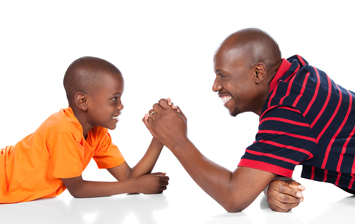
|
When it comes to fatherhood, these same lazy and uninformed tropes are used to paint the picture that Black men don’t want to take responsibility for their children and have no desire to be involved in the lives of their sons and daughters. While this may be true in some cases, this is once again an overwhelmingly false notion used to paint Black men in a negative light.
It’s no secret that in today’s society, Black men have to jump through hoops, hurdles and are constantly trying to prove themselves and their value to the world. However, when it comes to those men who are fathers, these obstacles are even higher and more difficult to overcome. Still, as we continue to witness the rise in Black consciousness, particularly among men, it has become more important than ever to set a new example for young boys to not only follow, but to aspire to as well. But like the overcoming of negative stereotypes ascribed to Black men, changing the narrative and getting the future generations to follow suit, is not without its challenges.
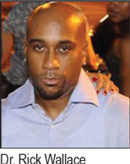
|
His organization is designed to help Black men achieve their rightful positions as heads of their own households and master of their God-given destiny, told The Final Call.
“I’m a firm believer that as a leader, you own the responsibility for the behavior and the performance of everyone you’re leading. So, if the people you’re leading aren’t performing, then as a leader, that’s on you,” Dr. Wallace added.
“I think that as Black men, we’re disconnected with the struggle—the pure struggle,” said Kenneth Braswell, founder and executive director of Fathers Incorporated, an organization that helps Black men understand the importance of responsible fatherhood and its positive impact on the Black community.
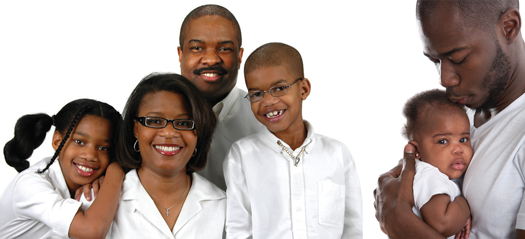
|
“We as a people, have really forgotten who we are, where our power resonates from, and that we are one, as a family. Today, Black men are so individually driven by, ‘I gotta get mine,’ and nothing more, that we don’t even think about ourselves as a collective anymore. That’s a bad thing for our culture, that’s a bad thing for our people, and that’s a bad thing for the Black family.”
One of the difficulties as it relates to both Black manhood and fatherhood, is the constant attack that men are under. Whether it be as a result of drugs, violence or mass incarceration, these things have not only been normalized within the Black community, but embraced and accepted as the Black way of life and the behaviors that “real men” should somehow take part in.
The impact that this has had on both the community and the children in it, can only be described in one word: poisonous. Black communities are shells of what they once were, and by extension, so are the people in them because there are not more positive images of Black men in the role of fathers.
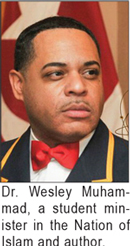
|
“He wasn’t a disempowering figure, nor was he a tyrant in the home. Bill Cosby, in his day, presented a very wholesome picture of Black fatherhood. But today, Bill Cosby is presented as a villain in society and if you ask young Black people today to name a Black father on television or in the media, they will probably name Lucious Lyons on the show Empire. But that character is hated by his children, the women in his life, and he’s not a good paternal role model at all. So, Black fatherhood has become villainized through today’s media portrayals,” said Dr. Wesley Muhammad.
“We have to recognize that those whom our young people are looking up to now—whether it’s the rappers, celebrities or even the trap boys on the block—even though we don’t like that our young boys are looking up to them instead of the positive males in our community, it’s easier for them to sell their negativity to our youth because they are the ones who are seen has having swagger and power, which is what our young people are attracted to,” he added.
This dynamic, unfortunately, has become so pervasive that it has caught the attention of Black youth from all walks of life—even those who are born and raised as practicing Muslims and trying to live righteous lives.
“All of our children have become so affected by this world—even those who are Muhammad’s children because they are feeding from the same information being presented,” says Dwayne Muhammad, who serves as Dean of Boys at Muhammad University of Islam in Chicago. “The Honorable Minister Louis Farrakhan said that we have to teach our children about everything that’s going on out in the world, because it has now crept into the house. He said we can’t think that because we’re Muslims, we’re safe,” Dwayne Muhammad told The Final Call.
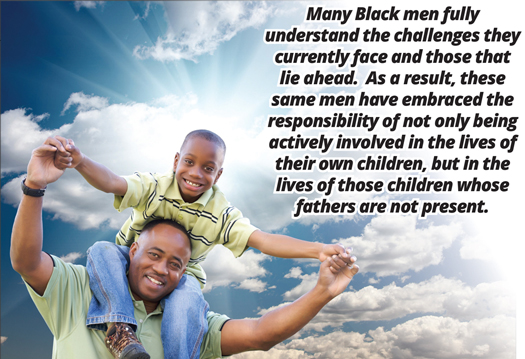
|
While these realities may paint the picture that there is no hope for the restoration of Black manhood and fatherhood, the truth of the matter is that situation isn’t as bleak as it seems. Yes, these are trying times for both the Black man and Black youth, and the negative stereotypes are another hurdle that has to be overcome. But through positive engagement and mentorship, this destructive and negative way of life that Black people have openly embraced, can be destroyed.
It’s just going to take some time, effort, and commitment by those who desire to see the Black man restored to his rightful position in society, and in the community.
“We understand that there are two primary ways of learning: precept and practice,” explained Dr. Wallace. “Precepts are the teachings of ideals, standards and parameters through rules. This is done through both verbal and written communication. Then you have practice where, you show what you’re saying in your precepts. It’s called modeling. What we have now is an absence of modeling, where you have a lot of young boys who are raising themselves.”
Modeling is the strongest aspect of learning, and it’s a natural desire for a young boy to do what his dad does, Dr. Wallace continued.
“There’s a significant number of Black men who are owning their responsibility and standing up like they’re supposed to, but they’re not going to get the attention. They’re not being actively promoted. So, what I try to do in my ‘Black Mean Lead’ initiative is infuse and teach proper behavior for men across the board, that can then be passed down to our young boys and give them a guide to follow.”
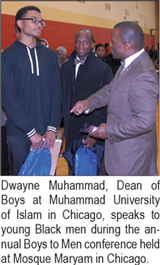
|
“You really can’t have this conversation without understanding the context of what has happened over the hundreds of years and to many generations of Black people since we’ve been in this country. When we do that, we’ll begin to see where the system has played a role in our demise, but more importantly, where we as Black men have contributed to our own demise as well. Then we can look at how to start reversing it because we’ll begin to understand that we have a choice to do something differently and then make a decision to do it.”
Many Black men fully understand the challenges they currently face and those that lie ahead. As a result, these same men have embraced the responsibility of not only being actively involved in the lives of their own children, but in the lives of those children whose fathers are not present. The old adage of, “It takes a village,” is one that seems to be seeing a resurgence in the Black community as more men openly embrace their responsibility as leaders in their homes and in their community.
Dr. Wesley Muhammad, one of the Black community’s foremost intellectual thinkers and scholars, hammered home the points made by Dr. Wallace and Mr. Braswell with this powerful statement, “This is the value of the Honorable Minister Louis Farrakhan. His swagger and his magnetic personality exemplify the beauty of Allah. That is why Farrakhan is transgenerational,” he added. “He is a magnet pulling Black people to him of all generations and there is no elder who commands the respect of the young people today like he does. Through his leadership, he helps Black men aspire to be better; not just for themselves, but as an example for our young people as well.”
INSIDE STORIES AND REVIEWS
-
-
About Harriett ... and the Negro Hollywood Road Show
By Rabiah Muhammad, Guest Columnist » Full Story -
Skepticism greets Jay-Z, NFL talk of inspiring change
By Bryan 18X Crawford and Richard B. Muhammad The Final Call Newspaper @TheFinalCall » Full Story -
The painful problem of Black girls and suicide
By Charlene Muhammad -National Correspondent- » Full Story -
Exploitation of Innocence - Report: Perceptions, policies hurting Black girls
By Charlene Muhammad -National Correspondent- » Full Story -
Big Ballin: Big ideas fuel a father’s Big Baller Brand and brash business sense
By Bryan Crawford -Contributing Writer- » Full Story






 Click Here Stay Connected!
Click Here Stay Connected!








